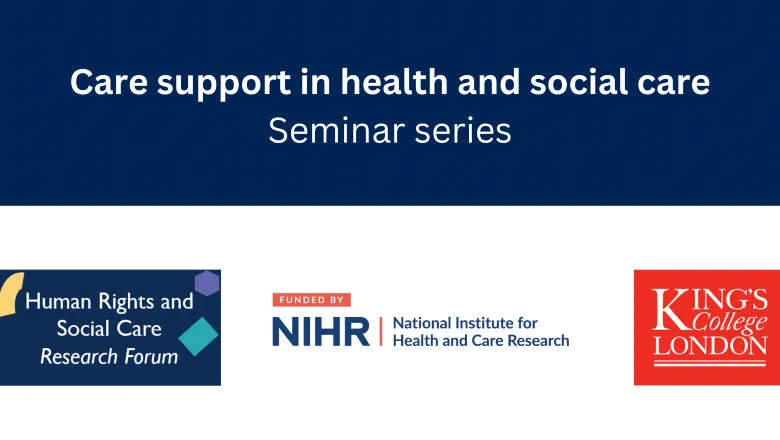13 July 2023
Developing a care partner policy: case studies from the NHS and social care
The second seminar in a three-part series about care support in health and social care

Guest speakers from NHS England and Serene Care Ltd shared their stories of working with families and residents as part of an online seminar yesterday lunchtime. The seminar was organised by Caroline Green and Jo Brown from the right to a care supporter study as part of a series of events exploring care support for older adults in health and social care.
The role of a ‘care partner’ or ‘care supporter’ can be difficult to define due to its potential overlap with other established terms such as unpaid carer or essential visitor. Lesley Goodburn and Jane Murkin from NHS England shared how they had worked with their advisory board to establish a working definition of a care partner for the NHS, drawing on work already taking place in Canada and Northern Ireland. The term ‘care partner’ aims to reflect the critical role that many caregivers play in providing physical and emotional support to partners, friends, family and neighbours who may need it. It is defined as a “practical role to provide additional support to patients regardless of the setting”.
Care partners are not just visitors, nor do they replace the unique role of healthcare professionals. Instead, they provide complementary support with decision making, care coordination and continuity of care. Lesley and Jane spoke about the evidence base of improved outcomes for patients when they are supported in hospital and the importance of ensuring that staff at all levels understand who care partners are and why they matter.
Turning to social care, Jo Brown interviewed Palvi Dodhia of Serene Care Ltd. Palvi co-founded Serene Care with her partner Jay and now owns three care homes across the Midlands. Speaking about her organisation’s values, Palvi focused on the need to treat every resident with dignity, kindness, and care. Good communication with families is vital to achieving this, as family members know what matters to their relatives and bring insights that staff may not have.
Running a care home during the COVID-19 pandemic brought many challenges for providers, residents and their families, particularly when information about visiting guidance was first heard through the media. Serene Care has recently employed a Client Relationship Manager to support engagement with residents’ families and provide them with a point of contact who is independent from the manager. This includes running an induction process for the families of new residents to build a strong relationship from the start and answer any questions. A constant feedback loop between the provider and the family gives Palvi confidence that she knows how things are really going and can respond to any concerns as soon as they arise.
During the Q&A session, discussion ranged from managing challenging behaviour in care homes to clarifying how the ‘care partner’ role relates to existing initiatives for carers. NHS England are about to begin a 3-month engagement process to work through the language and definitions associated with the care partner policy and identify what is unique about this role. Many people who provide unpaid care for a friend or family member might not identify as a ‘carer’, as highlighted in a recent Carers Week report. The care partner term is also designed to cover situations where people might need assistance in hospital but do not have a carer, such as when their admission is due to a traumatic event like a road traffic accident.
At the end of the discussion, Caroline asked the panel about how health and social care settings can work together in a complementary way to deliver a care partner policy. Jane responded that the policy should be regardless of care setting to support people crossing between health and social care. The team developing the policy aim to implement it in a way that is seamless for the patient and acknowledges the importance of the community they live in. Whilst the pilot sites for the policy have all been acute settings, the team are keen to explore a trial within social care.
The recording and slides from the event are available on request. For more information, please email Jo Brown (Joanna.2.brown@kcl.ac.uk).
—this event report is by Jo Brown

